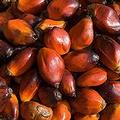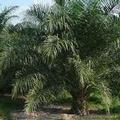 印尼一間大型農產公司姆辛馬斯農集團(Musim Mas Group Plantations)日前取得永續棕櫚油認證,成為印尼首例。
印尼一間大型農產公司姆辛馬斯農集團(Musim Mas Group Plantations)日前取得永續棕櫚油認證,成為印尼首例。
印尼是世界最大的棕櫚油產國,棕櫚油泛指棕櫚科油棕屬所產果實與種子所提煉出來的可食用植物油。前述永續認證,是依「永續棕櫚油圓桌會議」(Roundtable for Sustainable Palm Oil,RSPO)之原則與指標所核發的,用意在確保棕櫚油生產者負起環境與社會責任。
姆辛馬斯總裁卡林(Bachtiar Karim)表示:「這對印尼、對姆辛馬斯農集團來說,是重大突破,象徵我們持續努力製作高標準且永續的棕櫚油。但這還只是起步而已,未來公司所有單位都將加入審核機制。」
 棕櫚油被廣泛作為食用油,是人造奶油原料及許多加工食物添加物。也可以作為香皂、洗潔粉、個人護理產品及傷口護理。棕櫚油也是生質柴油的原料。但當熱帶雨林作為棕櫚油種植所用,將導致珍貴植物及紅毛猩猩等野生動物絕跡,並釋放出更多的溫室氣體進入大氣。
棕櫚油被廣泛作為食用油,是人造奶油原料及許多加工食物添加物。也可以作為香皂、洗潔粉、個人護理產品及傷口護理。棕櫚油也是生質柴油的原料。但當熱帶雨林作為棕櫚油種植所用,將導致珍貴植物及紅毛猩猩等野生動物絕跡,並釋放出更多的溫室氣體進入大氣。
雖然棕櫚油振興印尼經濟。但農地需求卻砍伐森林,破壞了生態系統降低生物多樣性,增加人類與瀕臨絕種生物衝突如蘇門答臘虎、紅毛猩猩以及大象。相較之下棕櫚無法吸收與雨林或是泥炭地等量的二氧化碳,因此有些數據顯示生物柴油甚至比一般柴油排放更多的碳。
姆辛馬斯的認證象徵全球保育機構WWF(世界自然基金會)以及其他單位為永續棕櫚油生產所付出的努力,其認證標準涵蓋八大原則、39類共144項指標,包括法律、經濟可行性、社會利益與環境適切性等層面。申請者必須符合標準始能獲得認證。
A large Indonesian plantation company has become the country's first certified maker of sustainable palm oil. Indonesia is the world's biggest producer of palm oil, an edible plant oil derived from the fruit and seeds of the Arecaceae Elaeis oil palm tree.
Musim Mas Group Plantations, is the first company in Indonesia to demonstrate that some of its plantations comply with the Roundtable for Sustainable Palm Oil, RSPO, Principles and Criteria, a set of standards that helps ensure that palm oil is produced in an environmentally and socially responsible way.
"This is a significant achievement for Musim Mas Group and Indonesia," said Musim Mas President Director Bachtiar Karim. "It underlines the on-going efforts in achieving the highest standards in operations and making palm oil production sustainable. This is the beginning and we are working towards full certification for all our business units."
Palm oil is widely used as a cooking oil, as an ingredient in margarine and as a component of many processed foods. It is used to make soaps, washing powders and personal care products, and is used to treat wounds. Palm oil also is a feedstock for biodiesel.
When tropical rainforests are cleared for oil palm plantations, valuable plants and animal species such as wild orangutans are lost and the greenhouse gas carbon dioxide is released into the atmosphere.
While palm oil enriches the Indonesian economy, developing plantations has resulted in deforestation, destruction of ecosystems, loss of biodiversity, and conflict between humans and endangered species like the Sumatran tiger, the orangutan, and the elephant.
Because oil palms do not absorb as much carbon dioxide as the rainforests or peatlands they replace, palm oil biodiesel can generate more carbon than petroleum diesel, according to some estimates.
Musim Mas' certification indicates the progress that the global conservation organization WWF and others have made to increase the number of palm oil producers who operate sustainably.
The standards include eight principles, 39 criteria and 144 indicators which describe in detail the requirements for legal, economically viable, socially beneficial and environmentally appropriate management and operations. These requirements must be met in order to be certified.

